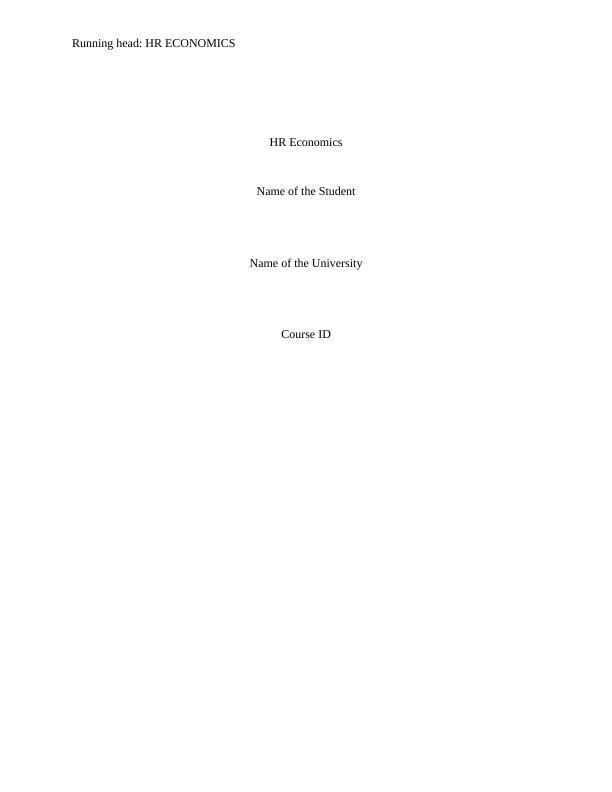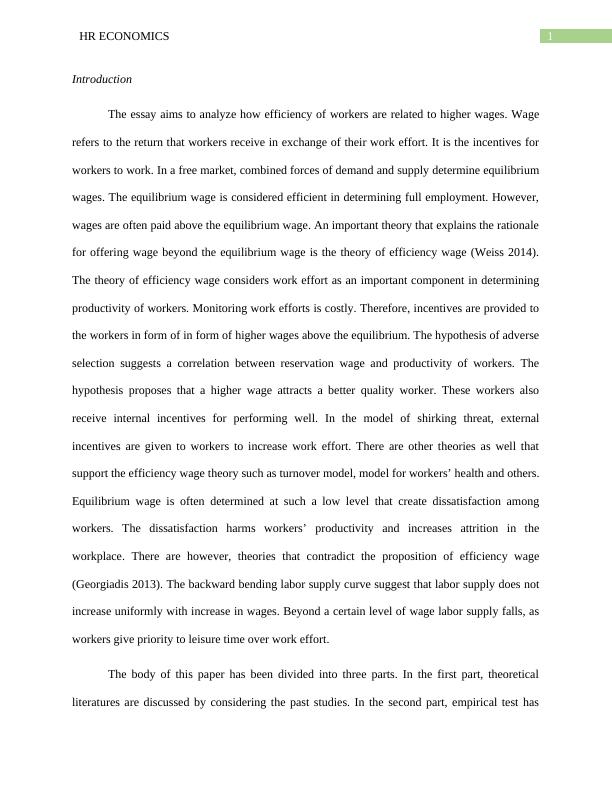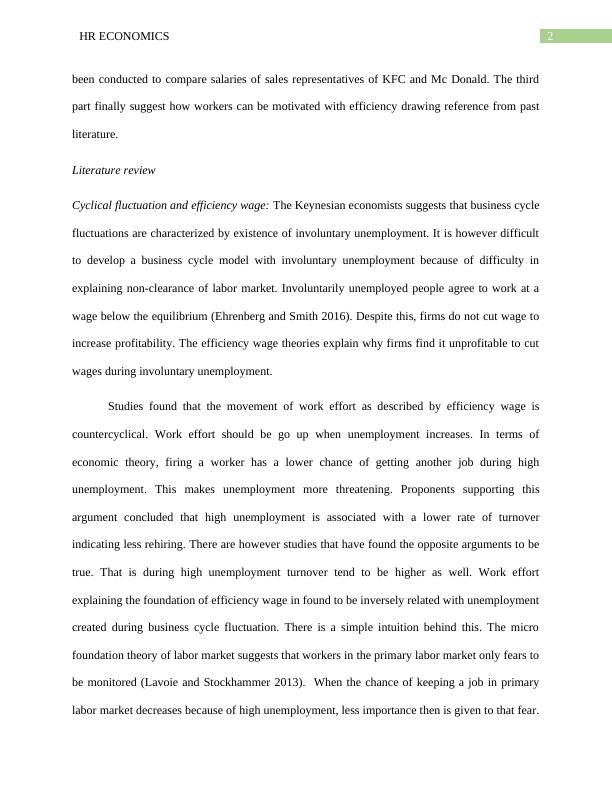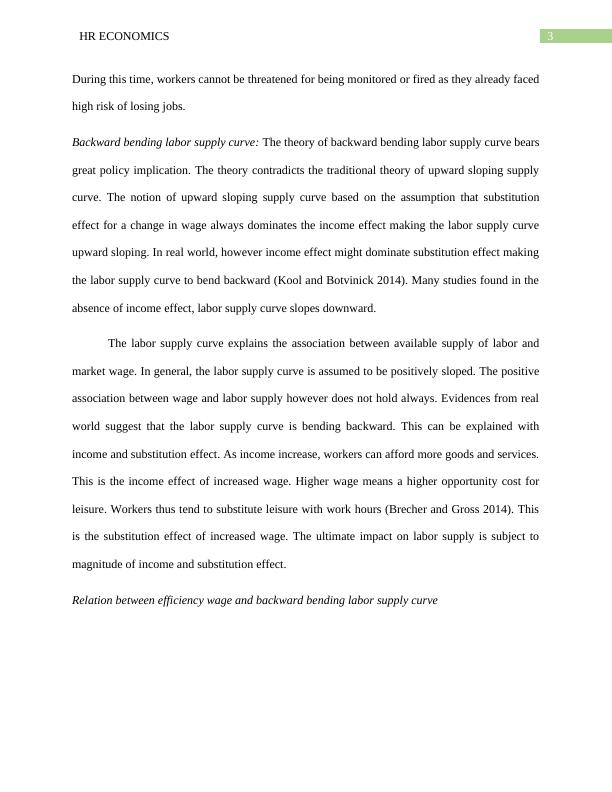Efficiency Wage Theory: How Higher Wages Affect Worker Productivity
Added on 2023-05-30
15 Pages4199 Words58 Views
Running head: HR ECONOMICS
HR Economics
Name of the Student
Name of the University
Course ID
HR Economics
Name of the Student
Name of the University
Course ID

1HR ECONOMICS
Introduction
The essay aims to analyze how efficiency of workers are related to higher wages. Wage
refers to the return that workers receive in exchange of their work effort. It is the incentives for
workers to work. In a free market, combined forces of demand and supply determine equilibrium
wages. The equilibrium wage is considered efficient in determining full employment. However,
wages are often paid above the equilibrium wage. An important theory that explains the rationale
for offering wage beyond the equilibrium wage is the theory of efficiency wage (Weiss 2014).
The theory of efficiency wage considers work effort as an important component in determining
productivity of workers. Monitoring work efforts is costly. Therefore, incentives are provided to
the workers in form of in form of higher wages above the equilibrium. The hypothesis of adverse
selection suggests a correlation between reservation wage and productivity of workers. The
hypothesis proposes that a higher wage attracts a better quality worker. These workers also
receive internal incentives for performing well. In the model of shirking threat, external
incentives are given to workers to increase work effort. There are other theories as well that
support the efficiency wage theory such as turnover model, model for workers’ health and others.
Equilibrium wage is often determined at such a low level that create dissatisfaction among
workers. The dissatisfaction harms workers’ productivity and increases attrition in the
workplace. There are however, theories that contradict the proposition of efficiency wage
(Georgiadis 2013). The backward bending labor supply curve suggest that labor supply does not
increase uniformly with increase in wages. Beyond a certain level of wage labor supply falls, as
workers give priority to leisure time over work effort.
The body of this paper has been divided into three parts. In the first part, theoretical
literatures are discussed by considering the past studies. In the second part, empirical test has
Introduction
The essay aims to analyze how efficiency of workers are related to higher wages. Wage
refers to the return that workers receive in exchange of their work effort. It is the incentives for
workers to work. In a free market, combined forces of demand and supply determine equilibrium
wages. The equilibrium wage is considered efficient in determining full employment. However,
wages are often paid above the equilibrium wage. An important theory that explains the rationale
for offering wage beyond the equilibrium wage is the theory of efficiency wage (Weiss 2014).
The theory of efficiency wage considers work effort as an important component in determining
productivity of workers. Monitoring work efforts is costly. Therefore, incentives are provided to
the workers in form of in form of higher wages above the equilibrium. The hypothesis of adverse
selection suggests a correlation between reservation wage and productivity of workers. The
hypothesis proposes that a higher wage attracts a better quality worker. These workers also
receive internal incentives for performing well. In the model of shirking threat, external
incentives are given to workers to increase work effort. There are other theories as well that
support the efficiency wage theory such as turnover model, model for workers’ health and others.
Equilibrium wage is often determined at such a low level that create dissatisfaction among
workers. The dissatisfaction harms workers’ productivity and increases attrition in the
workplace. There are however, theories that contradict the proposition of efficiency wage
(Georgiadis 2013). The backward bending labor supply curve suggest that labor supply does not
increase uniformly with increase in wages. Beyond a certain level of wage labor supply falls, as
workers give priority to leisure time over work effort.
The body of this paper has been divided into three parts. In the first part, theoretical
literatures are discussed by considering the past studies. In the second part, empirical test has

2HR ECONOMICS
been conducted to compare salaries of sales representatives of KFC and Mc Donald. The third
part finally suggest how workers can be motivated with efficiency drawing reference from past
literature.
Literature review
Cyclical fluctuation and efficiency wage: The Keynesian economists suggests that business cycle
fluctuations are characterized by existence of involuntary unemployment. It is however difficult
to develop a business cycle model with involuntary unemployment because of difficulty in
explaining non-clearance of labor market. Involuntarily unemployed people agree to work at a
wage below the equilibrium (Ehrenberg and Smith 2016). Despite this, firms do not cut wage to
increase profitability. The efficiency wage theories explain why firms find it unprofitable to cut
wages during involuntary unemployment.
Studies found that the movement of work effort as described by efficiency wage is
countercyclical. Work effort should be go up when unemployment increases. In terms of
economic theory, firing a worker has a lower chance of getting another job during high
unemployment. This makes unemployment more threatening. Proponents supporting this
argument concluded that high unemployment is associated with a lower rate of turnover
indicating less rehiring. There are however studies that have found the opposite arguments to be
true. That is during high unemployment turnover tend to be higher as well. Work effort
explaining the foundation of efficiency wage in found to be inversely related with unemployment
created during business cycle fluctuation. There is a simple intuition behind this. The micro
foundation theory of labor market suggests that workers in the primary labor market only fears to
be monitored (Lavoie and Stockhammer 2013). When the chance of keeping a job in primary
labor market decreases because of high unemployment, less importance then is given to that fear.
been conducted to compare salaries of sales representatives of KFC and Mc Donald. The third
part finally suggest how workers can be motivated with efficiency drawing reference from past
literature.
Literature review
Cyclical fluctuation and efficiency wage: The Keynesian economists suggests that business cycle
fluctuations are characterized by existence of involuntary unemployment. It is however difficult
to develop a business cycle model with involuntary unemployment because of difficulty in
explaining non-clearance of labor market. Involuntarily unemployed people agree to work at a
wage below the equilibrium (Ehrenberg and Smith 2016). Despite this, firms do not cut wage to
increase profitability. The efficiency wage theories explain why firms find it unprofitable to cut
wages during involuntary unemployment.
Studies found that the movement of work effort as described by efficiency wage is
countercyclical. Work effort should be go up when unemployment increases. In terms of
economic theory, firing a worker has a lower chance of getting another job during high
unemployment. This makes unemployment more threatening. Proponents supporting this
argument concluded that high unemployment is associated with a lower rate of turnover
indicating less rehiring. There are however studies that have found the opposite arguments to be
true. That is during high unemployment turnover tend to be higher as well. Work effort
explaining the foundation of efficiency wage in found to be inversely related with unemployment
created during business cycle fluctuation. There is a simple intuition behind this. The micro
foundation theory of labor market suggests that workers in the primary labor market only fears to
be monitored (Lavoie and Stockhammer 2013). When the chance of keeping a job in primary
labor market decreases because of high unemployment, less importance then is given to that fear.

3HR ECONOMICS
During this time, workers cannot be threatened for being monitored or fired as they already faced
high risk of losing jobs.
Backward bending labor supply curve: The theory of backward bending labor supply curve bears
great policy implication. The theory contradicts the traditional theory of upward sloping supply
curve. The notion of upward sloping supply curve based on the assumption that substitution
effect for a change in wage always dominates the income effect making the labor supply curve
upward sloping. In real world, however income effect might dominate substitution effect making
the labor supply curve to bend backward (Kool and Botvinick 2014). Many studies found in the
absence of income effect, labor supply curve slopes downward.
The labor supply curve explains the association between available supply of labor and
market wage. In general, the labor supply curve is assumed to be positively sloped. The positive
association between wage and labor supply however does not hold always. Evidences from real
world suggest that the labor supply curve is bending backward. This can be explained with
income and substitution effect. As income increase, workers can afford more goods and services.
This is the income effect of increased wage. Higher wage means a higher opportunity cost for
leisure. Workers thus tend to substitute leisure with work hours (Brecher and Gross 2014). This
is the substitution effect of increased wage. The ultimate impact on labor supply is subject to
magnitude of income and substitution effect.
Relation between efficiency wage and backward bending labor supply curve
During this time, workers cannot be threatened for being monitored or fired as they already faced
high risk of losing jobs.
Backward bending labor supply curve: The theory of backward bending labor supply curve bears
great policy implication. The theory contradicts the traditional theory of upward sloping supply
curve. The notion of upward sloping supply curve based on the assumption that substitution
effect for a change in wage always dominates the income effect making the labor supply curve
upward sloping. In real world, however income effect might dominate substitution effect making
the labor supply curve to bend backward (Kool and Botvinick 2014). Many studies found in the
absence of income effect, labor supply curve slopes downward.
The labor supply curve explains the association between available supply of labor and
market wage. In general, the labor supply curve is assumed to be positively sloped. The positive
association between wage and labor supply however does not hold always. Evidences from real
world suggest that the labor supply curve is bending backward. This can be explained with
income and substitution effect. As income increase, workers can afford more goods and services.
This is the income effect of increased wage. Higher wage means a higher opportunity cost for
leisure. Workers thus tend to substitute leisure with work hours (Brecher and Gross 2014). This
is the substitution effect of increased wage. The ultimate impact on labor supply is subject to
magnitude of income and substitution effect.
Relation between efficiency wage and backward bending labor supply curve

End of preview
Want to access all the pages? Upload your documents or become a member.
Related Documents
Relationship between Higher Wages and Efficiency in Agricultural Sectorlg...
|5
|1031
|334
Efficiency Wage Theory: A Critical Evaluationlg...
|8
|1541
|491
Report on Human Resource Economicslg...
|12
|2633
|250
Effectiveness of Pay for Performancelg...
|17
|4862
|146
Human resource economics PDFlg...
|10
|2297
|159
Minimum Wage and Efficiency Wage Theory in Business Economicslg...
|8
|1389
|142
